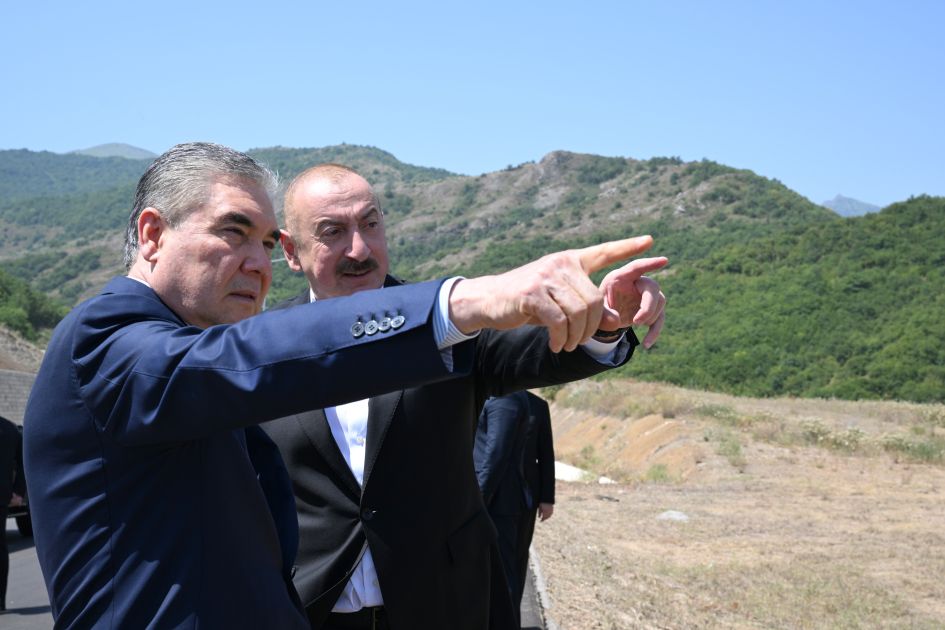Leaders of Azerbaijan, Turkmenistan open door to future projects

In a demonstration of growing regional solidarity and shared strategic vision, President of the Republic of Azerbaijan Ilham Aliyev hosted Chairman of the People's Council of Turkmenistan Gurbanguly Berdimuhamedov on a significant official visit marked not only by diplomatic engagement but also by powerful symbolic gestures. The visit underscores Azerbaijan’s ongoing commitment to fostering regional partnerships grounded in shared history, cultural ties, and a forward-looking development agenda.
The relationship between Azerbaijan and Turkmenistan is deeply rooted in a common Turkic heritage, linguistic affinities, and historical interconnectedness. These bonds have served as a natural foundation for a steadily evolving partnership. Since gaining independence from the Soviet Union, both nations have demonstrated an increasing willingness to engage in bilateral cooperation across multiple sectors, including energy, transportation, and humanitarian efforts.
Chairman Berdimuhamedov’s visit signals not only a reaffirmation of these ties but also an intention to expand the bilateral agenda in response to new regional dynamics. With shifting geopolitical alliances and increased attention on the Caspian region’s energy and transit corridors, Azerbaijan and Turkmenistan appear poised to play complementary roles in shaping Eurasia’s economic future.
Perhaps the most telling feature of the visit was the itinerary itself. The leaders’ joint visit to the liberated territories of Azerbaijan -particularly the cities of Fuzuli and Shusha - carried a potent symbolic message. By showcasing the scale of destruction caused by decades of Armenian occupation, Azerbaijan sought to communicate its narrative of revival and reconstruction, while also positioning itself as a resilient and forward-thinking state.
Chairman Berdimuhamedov’s presence in these symbolic locations underscores Turkmenistan’s solidarity with Azerbaijan’s territorial integrity and post-conflict development efforts. It also reflects the shared values of peace, stability, and cultural preservation that both countries espouse within the framework of international law and regional cooperation.
A major highlight of the visit was the detailed presentation of reconstruction projects in Fuzuli and Shusha. These cities - once devastated, now rapidly transforming into modern urban centers - represent Azerbaijan’s broader vision of post-conflict revitalization. With ambitious urban planning that includes smart city features, green infrastructure, and historical restoration, Azerbaijan is setting a precedent in the region for post-war recovery.
The reconstruction of Fuzuli, according to the Master Plan, involves a blend of modern functionality and cultural identity. With a target population of 50,000 by 2040, the city is being rebuilt to serve as a key transport and logistics hub in the Garabagh and Eastern Zangazur economic zones. The creation of memorials, creativity centers, hospitals, schools, and museums not only addresses the practical needs of resettlement but also helps to heal the collective trauma of displacement and destruction.
For Turkmenistan, whose own neutrality doctrine emphasizes peace and regional cooperation, such efforts present potential avenues for involvement - be it through construction expertise, energy cooperation, or cultural exchange. The visit could serve as a stepping stone toward greater engagement in Azerbaijan’s reconstruction economy.
In Shusha, the leaders visited newly developed residential complexes, religious monuments, and historical estates. These stops were emblematic of Azerbaijan’s attempt to restore not only infrastructure but also the soul of a region long subjected to cultural erasure. The revival of the Yukhari Govhar Agha Mosque and the ongoing construction of the New Shusha Mosque - rich in symbolic numerology and architectural ambition - highlight the centrality of religious and cultural identity in Azerbaijan’s post-war narrative.
The restoration of the Mehmandarovs’ Estate Complex further
cements Azerbaijan’s intention to preserve and showcase its
pre-Soviet aristocratic and intellectual heritage. The estate’s
transformation into a museum is part of a broader cultural
diplomacy strategy, one that may resonate with Turkmenistan’s own
emphasis on preserving historical identity amidst
modernization.
This visit is more than a bilateral encounter; it reflects the
evolving dynamics of regional cooperation in the post-conflict
South Caucasus. As Azerbaijan accelerates its rebuilding of
liberated territories and seeks to attract regional support and
investment, partnerships with culturally aligned states like
Turkmenistan gain added importance.
From a geopolitical lens, the visit reinforces the narrative of Turkic unity - a notion increasingly vocalized through forums such as the Organization of Turkic States. The shared symbolism, high-level coordination, and discussion of long-term development mark this meeting as a calculated effort to consolidate influence, extend strategic soft power, and diversify cooperation beyond hydrocarbons.
In the years ahead, both countries may explore more institutionalized forms of collaboration, including joint economic ventures, educational exchanges, and coordinated positions on regional infrastructure projects. Turkmenistan’s involvement could also have implications for trans-Caspian energy and transport initiatives, particularly if Ashgabat chooses to take a more active role in connectivity projects linking Central Asia with the South Caucasus and beyond.
Chairman Berdimuhamedov’s visit to Azerbaijan was far more than a ceremonial tour. It was a diplomatic gesture packed with historical resonance, cultural solidarity, and strategic foresight.
By engaging Turkmenistan at such a symbolic and critical juncture, Azerbaijan has not only deepened bilateral ties but also sent a broader message to the region - that peace, restoration, and partnership are the defining elements of a new era in the South Caucasus.
Here we are to serve you with news right now. It does not cost much, but worth your attention.
Choose to support open, independent, quality journalism and subscribe on a monthly basis.
By subscribing to our online newspaper, you can have full digital access to all news, analysis, and much more.
You can also follow AzerNEWS on Twitter @AzerNewsAz or Facebook @AzerNewsNewspaper
Thank you!

